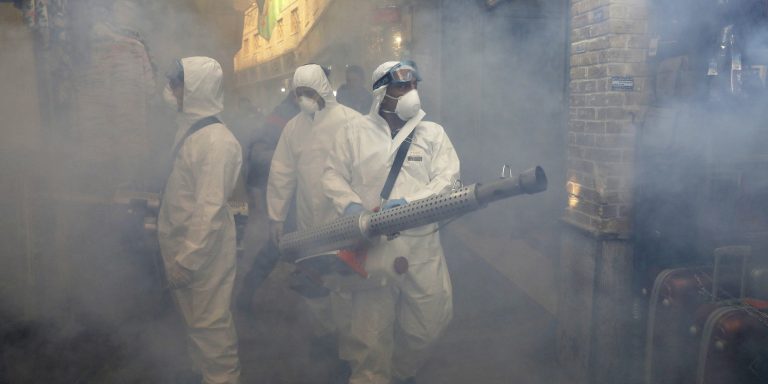INTELBRIEF
March 12, 2020
IntelBrief: Coronavirus Compounds Iran’s Difficulties

- Iran is the Middle East’s epicenter for the spread of the COVID-19 infection.
- The failure of Iran’s leaders to contain the virus add to the other ongoing challenges of the regime, including domestic unrest and U.S. economic and military pressure.
- Iran has become even more isolated in the region as its neighbors shut their borders.
- The effects of sanctions on Iran’s health care infrastructure might be hampering Iran’s response to the virus.
.
The spread of COVID-19 in Iran raises questions about the transparency of Iran’s regime and the capacity of the country’s health care system. As of March 11, Iran has over 9,000 confirmed cases of infection by the virus – by far the highest of any country in the Middle East and fewer only than China and Italy. Nearly 300 Iranians have died from the disease, including a key adviser to the Supreme Leader. Numerous Iranian officials have tested positive for the virus, including the deputy health minister, a vice-president, and nearly 10% of the membership of Iran’s 290-seat parliament. The widespread outbreak in Iran has rendered Iran more isolated in the region, because many citizens of regional countries who contracted COVID-19 did so after traveling to Iran. Several of Iran’s neighbors, including Iraq and Qatar, have banned travel to and from Iran. The restrictions have significantly slowed the flow of Shia pilgrims to Iraq’s Shia holy sites in Najaf and Karbala.
Apparently seeking to avoid admitting an obvious vulnerability, Iranian officials denied initial reports of Iranians contracting the virus, and global health officials strongly suspect that many more Iranians are infected than are being acknowledged by Iran’s government. Iranian officials did not confirm the presence of the disease among Iranians until February 19 and, even then, Iranian health officials claimed that they had been transparent. The late admission reinforced public resentment about government transparency, coming one month after Iranians protested the government’s initial denials that its air defense forces had accidentally shot down a Ukrainian passenger jet on January 8, 2020. Earlier, protests took place in over 100 Iranian cities and towns in November 2019 over the government’s sudden announcement of fuel price hikes. At the same time, the government’s reluctance to admit the extent of the disease likely reflects Supreme Leader Ali Khamene’i’s consistent concerns about appearing weak to Iran’s adversaries, particularly the United States.
Public and global criticism of the government’s handling of the coronavirus outbreak adds pressure on the regime, which has already been struggling to cope with the U.S. policy of ‘maximum pressure’ on Iran’s economy. The U.S. policy contributed to U.S.-Iran tensions that escalated into hostilities in December 2019 and January 2020. The rapid spread of COVID-19 in Iran has given U.S. officials an additional avenue to isolate Iran diplomatically. Since late February, Secretary of State Mike Pompeo has, on several occasions, asserted that Iran is deliberately obfuscating data on the spread of the virus and he has blamed Iran’s failure to contain it for facilitating the spread of COVID-19 throughout the region.
Yet, the Trump administration’s ability to criticize Iran’s handling of the health crisis is limited by the widespread perception that U.S. sanctions have weakened Iran’s healthcare system generally. The sanctions have reduced the availability of medical goods within Iran because, even though sales of such goods are exempt from U.S. sanctions, global banks have been reluctant to finance any transactions involving Iran. Accordingly, Tehran’s ability to import any goods, including medical items, has been significantly hampered. In February, in an attempt to counter criticism that U.S. sanctions on Iran are setting back global efforts to contain the disease, the Trump administration offered Iran assistance and issued new guidance to facilitate private U.S. donations of medical equipment to Iran. Iran ultimately refused the aid. Global health professionals assess that U.S. donations are likely to have only marginal effect on Iran’s ability to cope with the outbreak. Whether the Iranian public blames its own government, or U.S. sanctions, for the rapid spread of COVID-19 remains an open question.
.
For tailored research and analysis, please contact: info@thesoufancenter.org